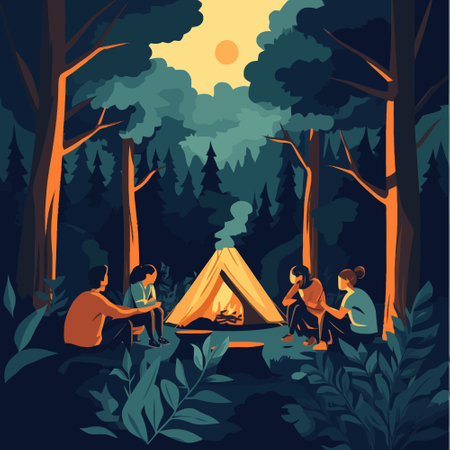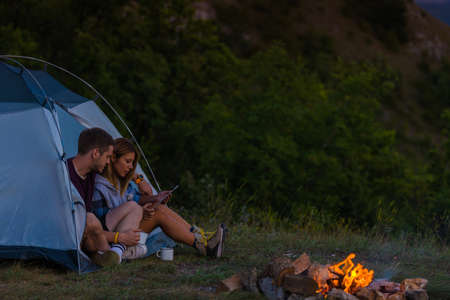1. Choosing the Right Campsite
Before you start packing your gear, it’s important to figure out where youre going. Picking the right campsite can make or break your weekend camping trip. Whether you’re looking for a peaceful getaway in nature or an adventure-filled weekend with friends, choosing the right destination depends on your goals and what kind of amenities you need.
Know Your Camping Style
Ask yourself what kind of camping experience you want. Are you into tent camping, RV camping, or maybe car camping? Each style comes with different needs and comfort levels.
| Camping Style | Best For | What You’ll Need |
|---|---|---|
| Tent Camping | Nature lovers, backpackers | Tent, sleeping bag, basic gear |
| RV Camping | Families, comfort seekers | RV with hookups, kitchen supplies |
| Car Camping | Weekend warriors, beginners | Car-accessible site, cooler, tent or SUV setup |
Choose a Destination That Matches Your Goals
If you want to hike and explore nature, consider national parks or state parks. If relaxation is your main goal, look for quiet campgrounds by lakes or in the woods. For social vibes or family-friendly activities, private campgrounds and RV parks might be a better fit.
Popular U.S. Camping Options:
- National Parks: Scenic views, hiking trails, limited amenities—great for adventure seekers.
- State Parks: Balance of nature and facilities—ideal for families and casual campers.
- Private Campgrounds: Often have showers, electricity, Wi-Fi—perfect for those who want comfort.
- RV Parks: Full hookups for water/electric/sewer—best for RV travelers.
Amenities to Look For
Amenities can vary widely from one site to another. Here are some features to check before booking your spot:
| Amenity | Why It Matters |
|---|---|
| Restrooms & Showers | Makes your stay more comfortable, especially for families or beginners. |
| Picnic Tables & Fire Rings | Add convenience for cooking and relaxing around the fire. |
| Water Access | Saves you from hauling heavy water jugs; great for drinking and washing up. |
| Electric Hookups | Necessary for RVs or if you plan to use small appliances. |
| Pet-Friendly Areas | If youre bringing your dog along, make sure pets are allowed. |
Pro Tip:
If it’s your first time camping, choose a campground close to home. That way, if you forget something important—or just realize camping isn’t your thing—you won’t be too far away.
The right campsite sets the tone for your entire weekend. Take time to research your options and match them with your expectations. Once youve picked the perfect spot, youll be ready to move on to planning what to pack!
2. Essential Camping Gear Checklist
Before you hit the road for your weekend camping getaway, its important to pack smart. Having the right gear can make all the difference between a relaxing trip and a stressful one. Here’s a breakdown of must-have items tailored specifically for short weekend adventures in the great outdoors.
Shelter and Sleeping Essentials
Your tent and sleep setup are key to staying comfortable overnight. Make sure everything is weather-appropriate and easy to set up, especially if youre arriving late or setting up in the dark.
| Item | Details |
|---|---|
| Tent | Choose a tent that matches your group size with an easy setup design. A 3-season tent is ideal for most weekend trips. |
| Ground tarp or footprint | Protects your tent floor from moisture and sharp objects. |
| Sleeping bag | Select a sleeping bag with a temperature rating suitable for expected weather. |
| Sleeping pad or air mattress | Adds comfort and insulation from the ground. |
| Pillow | Bring a compact camp pillow or stuff a sweatshirt into a pillowcase. |
Cooking Gear
Whether youre making s’mores or grilling burgers, having the right cooking equipment makes mealtime more enjoyable. Keep things simple but functional.
| Item | Details |
|---|---|
| Camp stove or portable grill | Small propane stoves are perfect for quick meals. |
| Fuel canisters | Make sure theyre full and compatible with your stove. |
| Pots, pans, and utensils | A basic set is enough—look for lightweight, durable options. |
| Plates, bowls, cups, and cutlery | Reusable camping dishware is eco-friendly and easy to clean. |
| Cooler with food and drinks | A medium-sized cooler can hold enough for a weekend; pack ice packs to keep things fresh. |
| Sponge, biodegradable soap, dish towel | For cleaning up after meals at your campsite. |
Clothing and Personal Items
Dress in layers and be ready for changing conditions. Even summer nights can get chilly depending on where youre camping in the U.S.
- Base layers (t-shirts, long sleeves)
- Insulating layer (fleece or hoodie)
- Waterproof jacket or rain poncho
- Comfortable pants or shorts (weather dependent)
- Socks (extra pairs just in case!)
- Hiking boots or trail shoes
- Sunscreen and bug spray
- Personal hygiene items (toothbrush, deodorant, etc.)
- Towel and washcloth
- Lantern or headlamp: Hands-free light source for nighttime activities.
- Batteries or charger: For any electronic gear you bring along.
- Campsite chairs: Perfect for relaxing around the fire.
- First aid kit: Always have one handy just in case of minor injuries.
- Campsite table (if none provided)
- Blanket for extra warmth or picnics
- Books, cards, or games for downtime fun
- Trekking poles if you plan on hiking trails nearby
- Hiking Boots: Ideal for rocky, uneven trails. Make sure they’re broken in before your trip.
- Camp Shoes: Lightweight sneakers or slip-ons for relaxing at the campsite.
- Socks: Bring extra pairs of moisture-wicking socks. Avoid cotton; opt for wool or synthetic blends.
- Hat & Sunglasses: Shield yourself from sun glare during hikes.
- Gloves & Beanie: Even summer nights can get chilly depending on your location.
- Lip balm & Hand sanitizer: Small but mighty helpers when you’re spending time outdoors.
- Breakfast: Instant oatmeal packets, scrambled eggs with pre-chopped veggies, or breakfast burritos wrapped in foil for easy reheating.
- Lunch: Sandwiches with deli meats or peanut butter and jelly, wraps, or pasta salad made ahead of time.
- Dinner: Foil packet meals (like chicken and veggies), hot dogs over the fire, or canned chili warmed up on a camp stove.
- Portable camp stove or grill
- Lighter or waterproof matches
- Small pot and frying pan
- Cooking utensils (spatula, tongs, stirring spoon)
- Cutting board and knife
- Bowl for mixing or serving
- Cups, plates, forks, spoons, and napkins/paper towels
- Biodegradable soap and sponge for washing up
- A cooler with ice packs for perishables if needed
- Map and compass: Old school but super dependable when GPS fails.
- GPS device or smartphone with offline maps: Great backup option if charged.
- Trail guide or printed directions: Especially useful in national parks or unfamiliar areas.
- Emergency whistle: Helps you signal for help if youre lost or injured.
- Flashlight or headlamp (with extra batteries): Essential for night-time visibility.
- Multi-tool or knife: Can help with everything from cutting rope to food prep.
- Fire starter (matches, lighter, fire starter sticks): Critical for warmth and cooking if needed.
- Emergency blanket or bivy sack: Compact and helps retain body heat in cold conditions.
- Check the weather forecast: Pack accordingly and avoid hiking during storms or high winds.
- Share your itinerary: Let someone at home know where youre going and when you plan to return.
- Learn basic first aid and survival skills: Even watching a few videos online can make a big difference in an emergency.
- Understand local wildlife risks: Know what animals are common in the area and how to safely store your food.
Other Camping Essentials
Optional but Nice-to-Have Extras:
Packing smart with these essentials ensures you’re ready to enjoy nature without unnecessary stress. Stick with the basics, focus on comfort, and remember—it’s all about enjoying the experience!

3. Clothing and Personal Items
When youre heading out for a weekend camping trip, packing the right clothes and personal items can make or break your experience. Weather in the great outdoors can be unpredictable—sunny one minute, chilly the next—so its important to pack smart and stay comfortable.
Layer Up: Be Ready for Changing Weather
Think in layers so you can easily add or remove clothing as temperatures change. Here’s a quick breakdown of what to bring:
| Layer | Purpose | Recommended Items |
|---|---|---|
| Base Layer | Wicks moisture away from skin | Moisture-wicking t-shirt or long-sleeve (synthetic or merino wool) |
| Mid Layer | Insulates and retains body heat | Fleece jacket or insulated hoodie |
| Outer Layer | Protects against wind and rain | Waterproof jacket or shell |
Footwear Matters: Choose Shoes for the Terrain
Your feet will thank you if you choose footwear that fits well and supports your activities. Here’s what to consider:
Packing Toiletries: Keep It Simple and Outdoor-Friendly
You won’t need your full bathroom setup out in nature. Go compact and eco-friendly with these essentials:
| Item | Description |
|---|---|
| Biodegradable Soap | Safe for nature and works for both body and dishes. |
| Toothbrush & Travel Toothpaste | A travel-size set saves space and weight. |
| Sunscreen & Lip Balm (SPF) | Protection from sun exposure is a must, even on cloudy days. |
| Bugspray or Repellent Wipes | Keeps mosquitoes and ticks at bay without taking up much room. |
| Quick-Dry Towel | Packs small, dries fast—perfect for camping. |
A Few Extras You’ll Be Glad You Brought
Packing smart clothing layers, solid footwear, and streamlined toiletries will help keep you comfortable, clean, and ready for whatever Mother Nature throws your way.
4. Planning Meals and Snacks
Eating well while camping doesn’t have to be complicated. With a little planning, you can enjoy tasty, satisfying meals without hauling your entire kitchen into the woods. Here’s how to keep your weekend camping trip delicious and stress-free.
Simple Meal Prep Ideas
When it comes to cooking outdoors, simplicity is key. Aim for meals that require minimal prep and cleanup. Here are a few beginner-friendly ideas:
Camping-Friendly Snacks
Snacks are essential for keeping energy levels up during hikes or just relaxing by the campfire. Choose items that don’t need refrigeration and are easy to grab-and-go.
| Snack | Why It Works |
|---|---|
| Trail Mix | High in protein and doesnt spoil easily |
| Granola Bars | Portable and filling |
| Dried Fruit | No refrigeration needed and satisfies sweet cravings |
| Beef Jerky | Packed with protein and shelf-stable |
| Crackers & Cheese (shelf-stable) | Tasty combo that travels well |
Basic Cooking Tools to Pack
You don’t need a full kitchen setup to cook great meals at camp, but there are a few essentials that will make life much easier:
Your Basic Camp Kitchen Kit Might Include:
Pro Tip:
Pre-chop your veggies and marinate meats at home before you leave. Store them in labeled ziplock bags or containers in your cooler to save time at camp.
A little preparation goes a long way when it comes to enjoying your meals outdoors. Stick to simple recipes, pack smart snacks, and bring the right tools — youll be surprised how good food tastes when youre surrounded by nature.
5. Safety and Emergency Preparedness
When youre heading out for a weekend camping trip, staying safe should always be a top priority. The outdoors can be unpredictable, so it’s important to be prepared for anything from minor scrapes to unexpected weather changes. Here’s what you need to pack to help keep yourself and your group safe during your adventure.
First Aid Kit Essentials
A well-stocked first aid kit is a must-have in your camping gear. You don’t need anything too fancy, but make sure it includes the basics:
| Item | Purpose |
|---|---|
| Adhesive bandages (various sizes) | Treat small cuts and blisters |
| Antiseptic wipes | Clean wounds to prevent infection |
| Gauze pads & medical tape | Cover larger wounds |
| Tweezers | Remove splinters or ticks |
| Pain relievers (like ibuprofen) | Help with pain or inflammation |
| Allergy medication (antihistamines) | Treat mild allergic reactions |
Navigation Tools
Getting lost in the woods is easier than you might think, especially if cell service is spotty. Always bring reliable navigation tools:
Emergency Gear to Pack
You’ll also want to include some emergency items that can help you deal with unexpected situations like bad weather or getting stranded.
Know Before You Go
Packing smart is only half the battle—knowing how to respond in an emergency is just as important. Before you leave home, take a few minutes to do the following:
Packing for safety might not seem exciting, but it’s one of the smartest things you can do before heading into the wild. With the right gear and knowledge, youll be ready for whatever comes your way—and enjoy your weekend camping trip with peace of mind.


